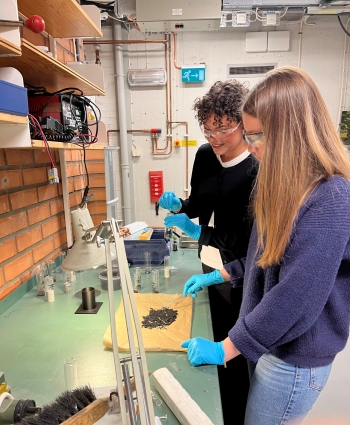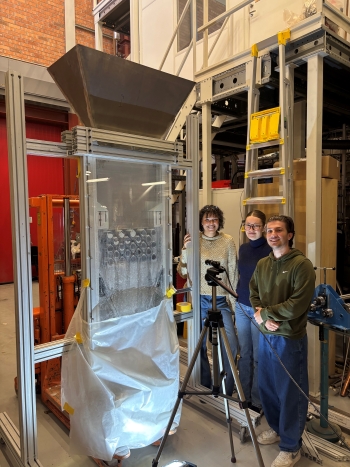Student Collaboration at KTH
Bachelor students and intern work on Powder2Power test rig for particle heat exchangers

As part of the Powder2Power research project, two KTH bachelor students and an international intern have contributed to the development and testing of a particle heat exchanger rig. Their work supports ongoing efforts to advance thermal energy storage technologies through hands-on experimentation and interdisciplinary collaboration.

Undergraduate students Ellen Turås and Carolina Myrvoll at KTH Royal Institute of Technology are making significant contributions to the Powder2Power project (P2P), particularly through their work on a test rig designed to investigate flow dynamics in particle heat exchangers—an essential component of high-efficiency thermal energy storage systems. This collaborative effort also involves international talent, including Quentin Lannoy, an internship student from Ecole D’ingénieur Généraliste IMT Mines Albi, whose expertise has helped push the project’s development forward.
The P2P project is focusing on advancing particle-based superheater for THEMIS concentrating solar power plant in the Eastern Pyrenees, France. Among other partners, KTH’s specific contribution is designing the suitable superheater for particle loop and optimising plant operation from the-economic perspective. The newly developed test rig at KTH allows researchers to simulate and study particle flow in representative models of horizontal tubular heat exchanger, using Particle Image Velocimetry (PIV) techniques to track the movement of thousands of particles as they interact with the tubular elements of heat exchanger.
Ellen Turås and Carolina Myrvoll, third-year bachelor students at KTH, have been actively participating and contributing to this research as part of their KEX project. They have played vital roles in developing the test rig and conducting flow dynamics experiments.
“It’s been incredibly rewarding to see our work on the test rig directly contribute to the project’s progress,” said Ellen Turås. “We’re applying theoretical knowledge in a real experimental environment and learning how to optimise systems that could play a major role in the future of energy storage.”
Carolina Myrvoll added: “We have tested in the lab several methods of particle tracing, which required a lot of effort. The data we’re gathering help improve the design of the test rig.”

In addition to the KTH students’ contributions, Quentin Lannoy, an internship student from ECOLE D’INGÉNIEUR GÉNÉRALISTE IMT MINES ALBI, has brought a fresh international perspective to the team. Quentin’s background in mechanical engineering and computing has made him an invaluable asset to the project. He has worked alongside the KTH students to optimise the test rig’s software component of PIV algorithm application to ensure the reliability of measurements across different experimental setups.
Quentin shared, “The collaboration between KTH and my university has been a fantastic opportunity to apply my academic knowledge to real-world research. Working with such a dedicated team on the Powder2Power project has broadened my understanding of thermal energy systems, and it’s exciting to see how our collective efforts are shaping the future of energy storage.”

Dr. Taras Koturbash, experimental researcher of the Powder2Power project, praised the international cooperation: “The collaboration between KTH students and Quentin has been extremely productive. Quentin’s contributions have helped refine our experimental methods, and the partnership between KTH’s undergraduates and international interns enhances the diversity of ideas and technical approaches, which is crucial for driving innovation in energy research.”
With the combination of KTH’s bachelor students and Quentin’s internship, KTH’s Powder2Power project team continues to make strides in particle-based superheater research. The involvement of both local and international students provides a dynamic environment for knowledge exchange and hands-on experience, contributing to KTH’s broader mission of fostering innovation in energy technology. For more information about the project or potential collaborations, feel free to contact Dr. Taras Koturbash.
